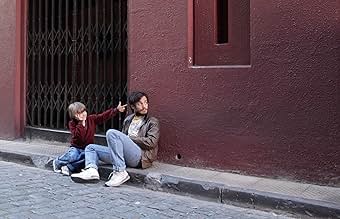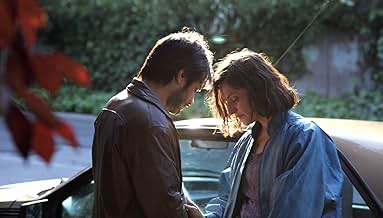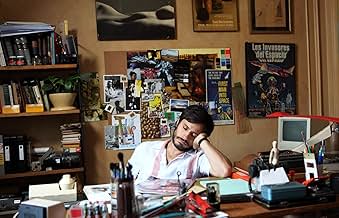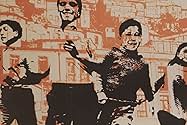Un ejecutivo de publicidad presenta una campaña para derrotar a Augusto Pinochet en el referéndum chileno de 1988.Un ejecutivo de publicidad presenta una campaña para derrotar a Augusto Pinochet en el referéndum chileno de 1988.Un ejecutivo de publicidad presenta una campaña para derrotar a Augusto Pinochet en el referéndum chileno de 1988.
- Dirección
- Guionistas
- Elenco
- Nominado a 1 premio Óscar
- 15 premios ganados y 28 nominaciones en total
- Dirección
- Guionistas
- Todo el elenco y el equipo
- Producción, taquilla y más en IMDbPro
Opiniones destacadas
"No" refers to the vote of "No" in a national referendum held in Chile in 1988 with the question of extending the dictatorial presidency of Augusto Pinoche for another eight years. Hip young advertiser Rene Saavedra (Bernal) was tasked to lead the advertising campaign for the impossible "No" vote. His modern methods meet resistance within the "No" camp. It also put his and his family's safety at risk. Will Saavedra's unorthodox political advertising techniques get the job done?
I found this account of Chile's recent history very educational and interesting. As I also come from a country that lived through and deposed a dictator through a peaceful revolution just a year or so before this event in Chile history, I recognize and identify with the experience and sentiments of the people involved.
I did not know whether "Yes" or "No" won, so there is very palpable suspense while watching this very realistic film. It felt like a documentary in its faded color palette, gritty camera work, accurate production design, and interweaving of actual news footage. It was also quaint in the cultural sense, as we learn about unique societal attitudes and behavior in Chile, a country I know very little about.
Maybe its chances of winning the Oscar are not too big since it is up against the higher profile "Amour", which is also nominated for Best Picture and Best Director. However, I am thankful for its nomination because this history buff has learned a lot from this film.
Pinochet's government were an arrogant bunch; 15 years of dictatorship will do that to you, to the point that the election was largely seen as a farcical exercise merely to validate his rule.
So, the fact that this election campaign won a seemingly un-winnable election and validate real democracy in that it began the end of Pinochet's rule is still a pretty incredible turn of events.
The film itself tells the story of Rene Saavedra (Gael García Bernal) an in demand advertiser with a troubled home life who spearheads the NO campaign by putting a positive, consumerist spin on it with plenty of humour to be had... www.ravechild.co.uk
Overall, this film is mildly interesting but should have been a lot better. For a better look at the Pinochet administration, try watching the three "Battle of Chile" films. Additionally, for a better film that is critical of repression in South America, try the Oscar-winning "The Official Story"--a film that has heart, emotion and is much harder-hitting in the way it addresses the fall of the Argentinian regime.
The time is 1988 and Pinochet has been in power since 1973. In a calculated move to mitigate external pressure against his ironfisted regime, Pinochet confidently initiates a national referendum calling on citizens to vote and decide, whether an eight-year extension into 1996 is valid. The probabilities of course, are carefully measured and his likelihood of winning is rock solid.
In this heartfelt homage to Chilean history, both sides are attempting to secure voters by fighting it out via 30-minute spots on TV — 15- minutes for the "Yes" camp and 15-minutes for "No".
An agency that employs René has been commissioned to design a series of ads for the Government of Junta; with bossman Luis Guzmán (Alfredo Castro) helping Pinochet. Conflicts of interest arise when René exercises his liberty as a freelancer in contra — to formulate the opposition's campaign.
Story begins with a cold open showing creative grit — René is previewing a new commercial with clients in the beverage industry. Within the first few minutes, we find out who he really is — a shrewd and introspective creative director, highly sought after in the business, bit of a rebel in the vein of Don Draper — someone who believes in unorthodox methods and selling the notion of freedom.
A sudden visit from opposition manager José Tomás Urrutia, interrupts his meeting with the clients. In conversations between René and José interfused with a dinner scene between René and his boss, Luis — we drift through a climate of skepticism surrounding the legitimacy of Pinochet's reign, residual fears evolved from the red scare, and reservations about United States after their alleged involvement in the Chilean Coup of 1973. Accusations and recriminations are spewed in hushed, civil tones. Disparity in views (as they are in life) are documented in raw, unfiltered strides.
In a sequence depicting René's journey home on a skateboard, audacious visual-aural symphony amplifies his transformation, and the situation about to unfold. A representative of young blood, it is here that Larrain's spunky protagonist displays progressive streak coursing through his veins, thus establishing an emotional, life-affirming choice provoked by his earlier exchange with Luis.
The film charts two narrative blueprints juxtaposed next to each other: the No campaign from inception to post-referendum, and how it is inextricably linked to René's democratic ideology. Against the backdrop of fierce competition between both camps, his middle-class existence as a single father still harboring feelings for the ex-wife comes into close, thematic focus.
When public opinion becomes cultural movement and things begin to swing in favor of No's provocative campaign; hinting at political activism cleverly cloaked in neutral concepts such as love, happiness and freedom, Pinochet's lackeys begin a series of menacing threats that hover in dangerous, unpredictable shadows. Shot with an aspect ratio of 4:3 using analogue tape; the format also implies a cautionary facet to this film — concerned with lasting effects created by commercials in the heydays of TV, suggesting how a simple medium and viral marketing can radically influence political views of the masses, creating landslide victories for the underdog.
Things comes to a hauntingly ironic conclusion, that much is obvious, but No is a tremendously simple film that burns with quiet ferocity. Pablo Larrain displays talent in using visual moods, incisive dialog and dramatic scores; giving shape to the social atmosphere in 1980s Chile — rife with unquenchable thirst for liberty and change, yet pensive and scarred by a violent past.
Although punctuated with flashes of humor and scathing wit, this Oscar nominee in foreign language category is an intense historical drama that works on a deeper level by finding resonance with universal emotions. Passion seeps through every frame, culminating in a mood most aptly expressed by Tchaikovsky's valse sentimentale.
cinemainterruptus.wordpress.com
-Lucas Buvinic
¿Sabías que…?
- TriviaSeveral people from the actual "No" campaign in Chile were hired to play members of the "Yes" campaign in the film.
- ErroresTodas las entradas contienen spoilers
- Citas
Publicista Campaña Sí: [Speaking to the YES Campaign board] If you want to scare people, you have to scare them with their past, their past poverty, long lines to buy bread. The opposition has its cries of socialism, yes. But the only thing that interests people is the scramble, and also they know that socialism is miserable. Instead you have a system in which anyone can be rich. Attention!, not 'everyone'... 'anyone'. You can not lose when all are committed to be that 'anyone'.
- Créditos curiososThe opening and closing credits all feature easel paper pads with prologue, title and ending credit roll call, showing a person's hands flipping over each page.
- ConexionesEdited into No, la serie (2014)
- Bandas sonorasLa alegria ya viene
Written by Sergio Bravo & Jaime de Aguirre
Selecciones populares
- How long is No?Con tecnología de Alexa
Detalles
- Fecha de lanzamiento
- Países de origen
- Sitios oficiales
- Idioma
- También se conoce como
- Нi
- Locaciones de filmación
- Productoras
- Ver más créditos de la compañía en IMDbPro
Taquilla
- Total en EE. UU. y Canadá
- USD 2,343,664
- Fin de semana de estreno en EE. UU. y Canadá
- USD 71,742
- 17 feb 2013
- Total a nivel mundial
- USD 7,699,095
- Tiempo de ejecución1 hora 58 minutos
- Color
- Mezcla de sonido
- Relación de aspecto
- 1.40 : 1
Contribuir a esta página


![Ver Tráiler [OV]](https://m.media-amazon.com/images/M/MV5BODAzODZiZjEtNWY5Zi00NDU3LWI1NzEtNGZlNDk2YjBlMzkwXkEyXkFqcGdeQXRodW1ibmFpbC1pbml0aWFsaXplcg@@._V1_QL75_UY281_CR7)




































